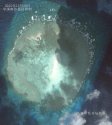Blackstone
Brigadier
PHNOM PENH (Reuters) - U.S. Secretary of States John Kerry met Cambodian leaders on Tuesday but failed to secure their commitment to a more robust stance with Southeast Asian nations against China's pursuit of territorial claims in the South China Sea.
Kerry was in Cambodia after a visit to neighboring Laos as part of an effort to urge unity among leaders of the 10-nation Association of Southeast Asian Nations before a summit with President Barack Obama in Sunnylands, California, next month.
In Phnom Penh, Kerry met Hun Sen, Asia's longest serving prime minister, and Foreign Minister Hor Namhong for what Kerry described as "candid and constructive" meetings.
Hor Namhong said Cambodia's position on the South China Sea was unchanged. It believed individual countries should settle disputes among themselves without the involvement of ASEAN, he said.
That mirrors China's position that ASEAN is not a party to territorial disputes, so rows should be resolved bilaterally.
U.S. Secretary of State John Kerry holds "I love Cambodia" t-shirt that he bought for his …
"We want it open to negotiations in the future between countries who made claims in the South China Sea," Hor Namhong said.
China claims almost all the South China Sea, which is believed to have huge deposits of oil and gas, and has been building up facilities on islands it controls. Brunei, Malaysia, Vietnam, Taiwan and the Philippines also have claims.
Laos is the 2016 chair of ASEAN. Kerry said Prime Minister Thongsing Thammavong told him on Monday that Laos wants to sea a unified association and avoid the militarization of the South China Sea.
When Cambodia was ASEAN chair in 2012, it was accused of obstructing a consensus in the bloc over standing up to China's assertive pursuit of its South China Sea claims.
"Cambodia was not a court that could judge that this island belongs to this or that country," Hor Namhong said on Tuesday.
U.S. Secretary of State John Kerry is welcomed by Cambodia's Prime Minister Hun Sen in Phnom Pen …
Kerry did not refer to the South China Sea in a statement after the meetings but stressed that the United States and ASEAN have a strategic partnership "and Cambodia plays a role in fully defining that partnership".
Chinese Foreign Ministry spokeswoman Hua Chunying, answering a reporter's question about a U.S. official urging ASEAN to unite to protect maritime rights, said that official did not represent ASEAN.
"I hope the United States can play a constructive role for peace and stability in Asia Pacific region and not sow discord,” she told reporters at a regular press briefing.
Cambodia said it would work with the U.S. on efforts to combat Islamic State, Kerry said.
Kerry was due in China later on Tuesday, where he is expected to press Beijing to put more curbs on North Korea after its nuclear test this month and reiterate U.S. concerns about China's behavior in the South China Sea.
He called North Korea's nuclear program "about one of the most serious issues on the planet today, which is a clearly reckless and dangerous, evolving security threat in the hands of somebody who is questionable in terms of judgment and has proven thus to China".
A senior official of the U.S. State Department said Kerry was expected to stress the need for a united front in response to North Korea through additional U.N. sanctions and for a tough unilateral response from China, which is North Korea's main ally and neighbor.
Last edited by a moderator:


